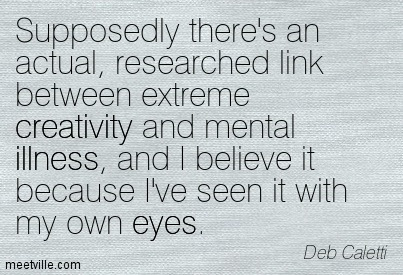Writing on the Edge of Insanity
���I became insane, with long intervals of horrible sanity.���
�����Edgar Allan Poe
���Men have called me mad; but the question is not yet settled, whether madness is or is not the loftiest intelligence��� whether much that is glorious��� whether all that is profound��� does not spring from disease of thought��� from moods of mind exalted at the expense of the general intellect.���
�����Edgar Allan Poe
���There’s a fine line between genius and insanity. I have erased this line.���
�����Oscar Levant
���THE EDGE, there is no honest way to explain it because the only people who really know where it is are the ones who have gone over.���
�����Hunter S. Thompson
���The difference between genius and stupidity is that genius has its limits.���–Albert Einstein
The truth is���no studies prove any correlation between creativity and mental illness. In fact, to the contrary, psychosis and poor mental health seriously compromise the ability to function.
http://www.huffingtonpost.com/dr-r-keith-sawyer/creativity-and-mental-ill_b_2059806.html
However, the medications used to treat mental illness can also seriously compromise the ability to function.
I have not been totally satisfied with my writing since Red Clay and Roses in 2012. Lately, since I started on a new medication in 2013, my writing seems stilted, choppy, not nearly as fluid as it once was and I���m not able to readily pull up words that once came easily to me.
To enhance my writing capabilities and overcome some of the hindrances of my bipolar meds, my psychiatrist and I are undertaking a huge joint project.
I���ve kept no secrets about my bipolar disorder. I���ve been in treatment since the age of nineteen, and unlike most, have always been compliant. There were times in my life when my psychiatrist worked with me to reduce side effects of meds���to get through my five chemistry classes in school, to carry my three children, and so on. It has been a very long time since I have been off meds.
Altered thought processes can be a blessing or a curse.
When my thought processes are mildly altered, my creativity is greatly enhanced.
But that is a fine line to walk.
I have been stable for the most part. I am grateful. I have had some breakthrough episodes where the meds became ineffective and had to be changed.
To understand what goes on with the bipolar brain, you have to understand the role of norepinephrine and how the meds work.
Norepinephrine�� is a catecholamine with multiple roles including as a hormone and a neurotransmitter.
As a stress hormone, norepinephrine affects parts of the brain where attention and responding actions are controlled.
Along with epinephrine, norepinephrine also underlies the fight-or-flight response, directly increasing heart rate, triggering the release of glucose from energy stores, and increasing blood flow to skeletal muscle. Norepinephrine can also suppress neuroinflammation when released diffusely in the brain from the locus ceruleus.
In the bipolar person, the norepinephrine floods and causes the person to be in a constant state of fight-or-flight. That���s a hard way to live. Moods swing from rage to withdrawal.
Mood stabilizers, like Latuda and Zyprexa, don���t stop norepinephrine from being produced, but block the reuptake of it in the brain.
Instead of a constant flood of this neurotransmitter, there is a more balanced stream.
So what���s the problem with the meds?
Remember when I said attention and responding actions were affected?
While in the sick person, slowing the attention down can prevent scattered thought process, delusions, and paranoia���it also slows down the ability to think, to call things up from memory.�� It helps to keep thought processes connected, but can hinder creativity and cause sedation. Everything slows, including response time, so thinking can become more difficult. Reading and writing are affected. Finding the right words for expression of ideas can be inhibited. Imagination is severely stifled on psychotropic medications.
Anything that slows the brain also slows metabolism. People gain weight on these drugs.
There is also a very narrow window that allows most lucid thinking without any of these side effects.
That���s what my psychiatrist and I are trying to do. He���s willing to work with me to find that window.
It is a tedious process for the physician to titrate these drugs and can only be done with those patients who have very good insight and intuition, because it is done based on subjective responses.
Our emotions and behaviors have to be monitored by those close to us.
It���s a high wire act that involves removing the balancing pole and learning to walk the wire with less assistance. The consequences can be devastating, even life-threatening.
I’m going on a pharmaceutical drug holiday!
So, if I start acting really weird(er), let me know.
This physician has followed me since 2002. It has taken more than a dozen years to build up the sort of mutual trust to be able to proceed with this experiment.
I’m both excited and scared.
Filed under: Healthy Lifestyle, Writing Process/WIPs Tagged: altered thought processes, balancing act, bipolar disorder, creativity, edge of insanity, medication adjustment, mental health, mental illness, pharmaceutical drug holiday, psychosis






